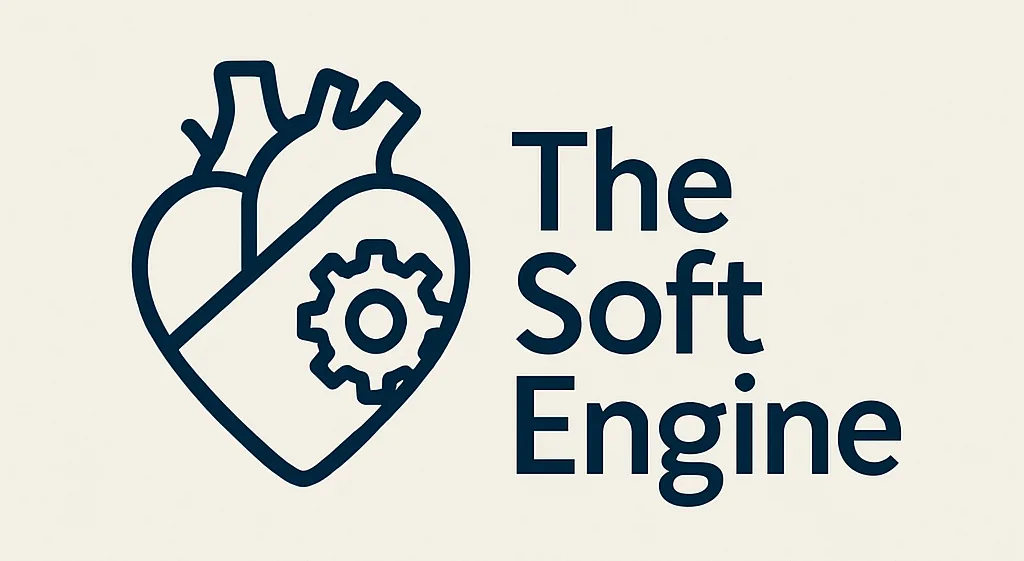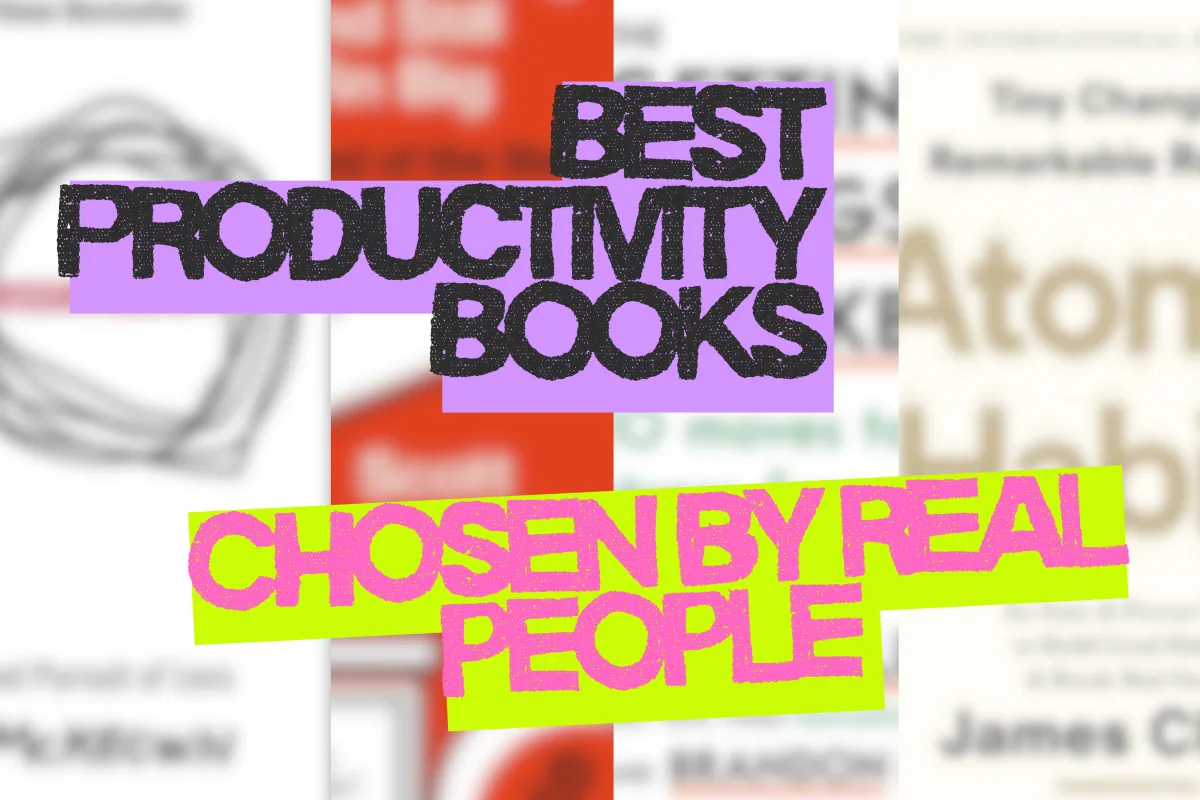Table of Contents
More than 25 million people have read Atomic Habits. Getting Things Done has shaped the way entire companies organize their workflows. The classics of productivity are classics for a reason – they work.
But not always. And not for everyone.
That’s where lived experience matters.
So instead of only handing you a polished list from CEOs and bestselling authors, we asked a different question: What are the best productivity books, the ones that real people (on Reddit, Goodreads, in forums, and group chat) actually say helped them get things done?
Best Productivity Books Real People Actually Recommend
Not every book that changes lives ends up on a bestseller list. So we went to the places where honest recommendations live and pulled the titles people return to again and again.
These are the books that real people say actually helped them focus, build habits, and get unstuck.
1. Essentialism by Greg McKeown
Most productivity books teach you how to do more. Essentialism teaches you how to do less and do it on purpose.
Greg McKeown argues that success isn’t about getting everything done; it’s about getting the right things done. Think of it as minimalism for your calendar.
Readers love how it reframes “no” as a strategy, not a weakness.
One reader summed it up: “Essentialism is where it’s at. Focusing on a few things you can execute on well will better serve you than saying yes to everything.”
It’s not a system with checkboxes; it’s a mindset shift. And for people drowning in obligations or corporate chaos, that shift feels like a life raft.
Another reader put it this way: “It didn’t give me a to-do list, but it gave me permission to stop saying yes to things that drain me.”
2. Getting Things Done by David Allen
Getting Things Done (or GTD) is the OG productivity bible. David Allen’s core idea? Your brain’s a terrible storage device. So get everything out of your head and into a trusted system and free up mental bandwidth for actual thinking.
People who love GTD often say it’s the first method that made their chaotic task list feel… calm.
One reader shared, “I implemented Allen’s system and found it very beneficial. I’ve been thinking of rereading the book and practicing his approach again.”
It’s a bit dated in tone (hello, PalmPilot references), but the method still hits. Especially if you feel like your brain has 47 tabs open and no one’s driving.
3. Atomic Habits by James Clear
We know, we know! But this one’s everywhere and with good reason. Atomic Habits breaks down behavior change into tiny, repeatable actions.
Instead of overhauling your life overnight, James Clear helps you get 1% better every day – and shows how that compounds into big wins.
Readers praise it for being refreshingly practical. “It breaks down the mechanics of habits in a super clear and straightforward way,” one reader said. Another added, “Getting 1% better every day can significantly improve your life long term.”
Some feel it’s a little overhyped, but even skeptics admit the habit loop (cue, craving, response, reward) sticks with you.
4. Deep Work by Cal Newport
If your brain feels like a tab graveyard and Slack never stops pinging, Deep Work might be your antidote. Cal Newport’s core argument: the ability to focus without distraction is becoming rarer and more valuable. And you can train it, like a muscle.
Many readers call this a game-changer, especially for creatives, developers, and anyone juggling big cognitive tasks.
One reader put it simply: “Deep Work is amazing.” Another admitted, “The only problem is finding time to get 3–4 hours of deep work in.”
It’s aspirational, sure, but it gives you a vision of what distraction-free work could feel like. And in an always-on world, that’s a win.
5. Thinking, Fast and Slow by Daniel Kahneman
This isn’t your typical productivity book, but it messes with your productivity brain in the best way.
Nobel laureate Daniel Kahneman dives into how we think: the fast, intuitive way (System 1) and the slow, logical way (System 2). Spoiler: the fast one runs the show way more than you realize.
Readers love it for the “aha” moments. “The book is a lengthy, self-conscious, and challenging read but highly recommended,” one said. Another added, “To get things done, we need to understand what stops us… Our brains are not rational at all.”
Fair warning: it’s dense. But if you want to understand your mind’s blind spots, it’s a must-read.
6. How to Fail at Almost Everything and Still Win Big by Scott Adams
The creator of Dilbert may not scream “productivity guru,” but Scott Adams delivers a surprisingly smart, self-aware guide to success.
His big idea? Ditch goals and build systems. Goals are binary and stressful; systems keep you moving forward.
Readers appreciate the blend of humor and honesty. One called it a “game-changer” for shifting from grind culture to sustainable effort. The book also introduces Adams’ “talent stack” concept—where being pretty good at a few things adds up to a major edge.
It’s unconventional, sometimes weird, but sneakily effective.
7. The 4-Hour Workweek by Tim Ferriss
A polarizing classic. The 4-Hour Workweek promises escape from the 9–5 grind via automation, outsourcing, and “lifestyle design.” To some, it’s freedom in book form. To others, it’s techno-libertarian fantasy.
Still, it’s widely cited as a mind-opener.
“The whole concept… figure out what you want your life to look like… with as few work hours as possible,” one reader explained. Another cautioned: “Inspiring, but not entirely realistic for ~99% of people.”
Even if you don’t build a drop-shipping empire in Bali, the book’s questions about time, priorities, and work-life boundaries still land.
Best Productivity Books: Classics That Still Work
Some books never leave the conversation, and that tells you a lot. These are the heavyweights: titles that shaped how we talk about focus, habits, and doing work that matters.
If you’re new to the genre or want to revisit the roots, start here.
1. The One Thing by Gary Keller and Jay Papasan
In a world obsessed with doing more, The One Thing dares to ask: what if you just did one thing and did it exceptionally well?
The book’s core question is a productivity classic:
“What’s the one thing I can do such that by doing it, everything else will be easier or unnecessary?”
Readers say it helps cut through the mental clutter and sharpen focus. It’s especially powerful for entrepreneurs, creatives, and anyone prone to multitasking themselves into oblivion.
2. Four Thousand Weeks by Oliver Burkeman
Four Thousand Weeks doesn’t teach you how to optimize your calendar. Rather, it teaches you how to stop trying.
Burkeman starts with a humbling fact: you’ll live about 4,000 weeks, give or take. So how do you make peace with your limits?
This isn’t your standard time-blocking manual. It’s a reflective, occasionally existential look at why chasing perfect productivity often leaves us emptier.
Readers call it the anti-hustle book they didn’t know they needed, especially those burned out by toxic efficiency.
3. Slow Productivity by Cal Newport
The latest from Deep Work author Cal Newport, Slow Productivity makes the case for doing less but better.
In contrast to the inbox-zero, 10x-everything culture, Newport suggests that long-term output actually improves when you protect your time and narrow your focus.
Readers appreciate how it balances ambition with realism. It’s a book for people who love meaningful work but hate feeling like a machine.
FAQ: Best Productivity Books
Q: What’s the best productivity book for beginners?
Start with Atomic Habits if you’re new to the genre. It’s practical, jargon-free, and helps you take small steps that stick. If you’re looking for something deeper but still accessible, Deep Work is a strong follow-up.
Q: Are classic productivity books still relevant today?
Yes, but with nuance. Systems like GTD still work, but they may need adapting to fit today’s tech and workplace chaos. That’s why books like Slow Productivity and Four Thousand Weeks are resonating now, they meet readers where they are, not where they “should” be.
Q: What book do people say actually changed their life?
Redditors and readers alike most often point to Atomic Habits, Getting Things Done, and Deep Work. The common thread? Each helped them build systems that stuck.
Conclusion: Productivity That Actually Fits Your Life
There’s no one right way to be productive, and no single book has all the answers. Some offer systems. Others offer perspective. But the ones that stick? They meet you where you are.
Whether you’re time-blocking like Cal Newport or just trying to stop saying yes to everything, the real win is finding tools that actually fit your life and not someone else’s version of success.
Go deeper with our guides on productivity and get started on the best of the rest of your life.

